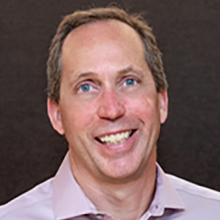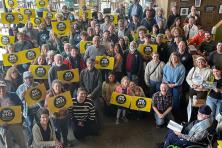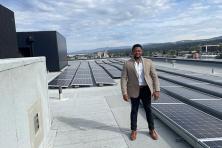Like many of you, I spent Saturday marching. I live one block from where the marchers gathered. At about nine that morning, I took my dog out for a walk and already it was clear that something special was going to happen. The streets were already starting to fill, and frustrated but determined drivers were trying to find parking spaces. An hour later, those tributaries of people turned into a raging river. I have never seen anything like the march in my life.
It was powerful to see women lead (and men follow!) the simultaneous marches around the globe. And I have been to plenty of marches with many issues represented, but there was also something different with the intersectionality of issues that we all face. Maybe it was because while everyone stood under their own banners, they also stood up for broader collective change, all wearing a unifying color of pink.
The day was exhilarating, affirming, and most importantly for me, motivating.
Since Saturday, I have been pondering what will come of the historic outpouring over the weekend.
Where to next?
We don’t have the answers yet—nobody does. This is a complex situation that will require action, reflection, listening, adjustment, and further action. And like with the marches, how we engage with each other and on these issues needs to look different. We need to bring an intention and focus and hold the broader collective of positive power in a different way.
Here are some of our ideas:
1. Seek out conversations with those you don’t know to find common ground. There were many first time marchers on Saturday. What got them there for the first time? What has changed and how can we reach out to more people? Let’s ask, learn, and have strangers become friends.
2. Instill accountability as you contact your elected officials to act on climate change and clean energy. We hear this a lot— the need to hold our leaders accountable. This now needs to look different too, and be consistent and authentic to break through the noise. Ideally, go meet with them. Show up in their offices, in their district offices, talk to them when you see them in the community. Call them and write to them. Use social media to put on the heat. If they vote the right way, thank them. If they don’t vote for stronger action, make sure they hear from you.
Right now, most elected officials know that the public supports taking strong steps to grow the clean energy economy and cutting climate pollution yet they feel the pressure from the deeply influential fossil fuel industry.
That has to change. So we have to change too and create new political action habits. I’ve picked up the phone and called my senators and representatives repeatedly since the election and the few minutes it takes is worth it.
There are going to be many opportunities to engage in the coming months, whether to support strong bills in Salem and Olympia or opposing the actions of the Trump administration and the Republican controlled Congress. If you want to know how to get more involved, please contact our field director Joelle Robinson at joelle@climatesolutions.org, or join our action network.
3. Make a personal plan for action for the year. There are so many opportunities for action right now. Make a personal or family plan for action. What are the most important things that you can do, and how do you want to create positive change in your community? What are the ways you can offer your unique talents, and give your time and financial resources, to make a difference on the issues that you care about? Be creative (wow, suddenly knitting was a skill leading up to the march!). Make a list. Stick to it. Share it. Act.
4. Make a contribution to support Climate Solutions or the many other great organizations working on climate change and other issues. I know this one probably will not be surprising to see on the list. But it matters. Here at Climate Solutions, we are drowning in opportunities and threats. Since the election, we have gotten more calls from people wanting to get involved than ever. We see more opportunities for making major progress in the Northwest than we have seen in a long time. And we see more threats looming from the likely rise of the fossil fuel industry in the Trump era. I talk regularly with the Executive Directors of other organizations, and they are seeing many of the same things. Resources allow us to beat back the fossil fuel industry, and to make nationally significant progress with major wins here in the region.
We are in unprecedented times. What is happening right now around the globe as a result of climate change is not normal. What is happening with our politics is not normal. And we should not act like it is.
The marches around the globe on Saturday sent a clear message that together we can send a powerful united voice that we want progress. Millions of individuals each made a decision to get out on the streets and take a stand. It’s a start, and a really powerful one.
If you have any ideas that you would like to share with me about what you think we should do next, please send them to gregg@climatesolutions.org. We have many thoughts about where to go next, but we will all be better off by sharing thoughts, iterating, getting smarter together.
I look forward to joining with you to make sure that 2017 is a year like one we have never seen before in rising up to meet the challenge of climate change.





